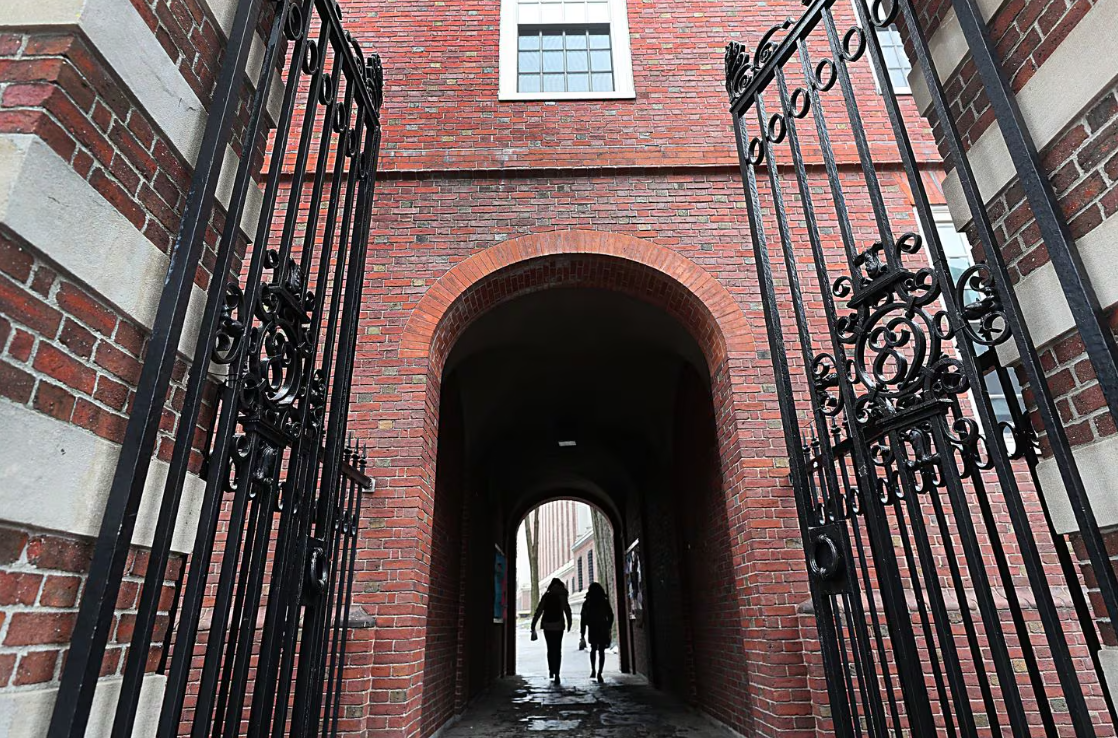哈佛大学最大的部门文理学院取消了招聘时对 DEI 声明的要求

【中美创新时报2024 年 6 月 3 日编译讯】(记者温友平编译)不到五年前,哈佛大学文理学院(FAS)追随了当时席卷美国高等教育的趋势。它规定,希望在哈佛工作的教授必须提交一篇论文,解释他们将如何在工作中促进“多样性、包容性和归属感(DEI)”。周一,该大学最大的部门宣布已改变方向,在收到“众多教职员工的反馈”后取消了这一要求,他们对强制性声明表示担忧。《波士顿环球报》记者麦克·达米亚诺(Mike Damiano)对此作了下述报道。
多元化声明似乎是学术招聘的常规部分,但随着大学努力解决这样一个问题:旨在使美国机构精英队伍多元化的善意努力是否有时与学术界的其他核心价值观相冲突,多元化声明已成为密切关注的焦点。
“通过要求学者宣称并炫耀对 DEI 的信仰,多元化声明的泛滥对学术自由构成了重大挑战,”哈佛法学院种族和民权学者兰德尔·肯尼迪 (Randall Kennedy) 在 4 月学生报纸《哈佛深红报》的一篇专栏文章中写道。
这篇文章在学术界广为流传。《华盛顿邮报》最近的一篇社论也对此表示赞同,该社论批评了强制性的多元化声明,并赞扬了麻省理工学院最近禁止使用此类声明的决定。
哈佛大学的政策变化是最新的信号,表明限制使用多元化声明的势头正在增强,随着各大学将多元化作为其使命的核心要素,这种声明在 2018 年至 2020 年期间变得无处不在。除了麻省理工学院,北卡罗来纳大学也通过了一项政策,实际上禁止了强制性的多元化声明。其他大学的教师团体也在敦促管理人员也这样做。
教务长尼娜·齐普瑟 (Nina Zipser) 在周一的公告中表示,今后终身教职候选人将被要求提供一份范围更广的“服务声明”,而不是一份专门关注“多样性、包容性和归属感”的声明。服务声明可以包括候选人促进多样性和包容性的努力,但不需要关注这些主题。
废除强制性多样性声明的举措正值保守派政客攻击多样性、公平性和包容性举措之际,学院内部也在反思某些 DEI 政策可能与其他大学价值观相冲突,包括言论自由和学术自由。
过去八个月,校园里围绕以色列-哈马斯战争的动荡挑战了大学应如何监管有争议的言论和保护少数群体的观念,关于 DEI 的争论愈演愈烈。一些保守派人士认为,与 DEI 相关的一些观点,包括将社会分为压迫者和被压迫者,加剧了反犹太主义。与此同时,一些左翼学者认为大学对多样性的定义过于狭隘,他们认为除了种族和性别因素外,这个概念还应包括观点多样性和社会经济地位。
其他人认为,这一决定是一系列多样性努力遭遇挫折的最新一次,其中包括最高法院去年禁止在大学录取中采取平权行动的决定。
哈佛大学肯尼迪学院历史学家哈利勒·纪伯伦·穆罕默德(Khalil Gibran Muhammad )批评 FAS 的决定是向共和党政客和“捐赠者活动家”投降的更广泛形式,他说,哈佛领导层对大学 DEI 办公室的批评基本上没有做出回应。他说,抛开多样性声明,“考虑到这一变化的大背景,可能会让最支持 DEI 的申请者不愿意申请哈佛的工作。”
这一背景包括哈佛大学首位黑人校长克劳丁·盖伊 (Claudine Gay) 受到的强烈反对,她在去年国会听证会上就反犹太主义问题发表了有争议的证词,并被指控其学术论文存在抄袭。在这场争议中,一些保守派嘲笑她是 DEI 努力的支持者和受益者。她于一月份辞职。
盖伊是哈佛大学 FAS 的院长,该学院涵盖整个本科课程和部分研究生院。2019-2020 学年,教职员工开始要求在终身教职申请中提供多元化声明。当时,各大学都在努力实现学生群体的种族和民族多元化,以应对其排斥历史。在 20 世纪的部分时间里,哈佛大学限制了黑人和犹太学生的入学。与许多精英大学一样,哈佛大学长期以来一直以精英子女的堡垒而闻名。
哈佛大学哲学教授兼本科生研究主任爱德华·霍尔 (Edward Hall) 认为,必须将多元化声明和更广泛的 DEI 工作放在那段历史的背景下理解。他说,像哈佛大学这样的大学还有很多工作要做,才能让校园对所有人都更受欢迎,包括来自代表性不足背景的学生和具有多元化观点的学生。他在《深红报》上发表的专栏文章中指出,多元化声明应该改革,而不是废除。
“建立一个多元化的社区是不够的,”他写道。“这个社区的成员需要体验到他们真正属于的社区,一个所有人都平等参与的单一社区。”
不过,他说他同意多元化声明反对者提出的一些观点。“我认为我们应该把愤怒引向正确的目标:不是多元化声明本身,而是对它们应该包含的内容的严重扭曲的看法,”他写道。
哈佛大学政治学家、美国政治研究中心主任瑞安·埃诺斯 (Ryan Enos) 表示,他在审查候选人时通常很少关注多元化声明。“你会觉得,这些声明更多地反映了候选人是否知道该说些什么,而不是真正致力于改善部门在多元化和其他问题上的表现,”他说。他表示,候选人倾向于写他们过去参与多元化倡议的情况、他们对与 DEI 工作相关的原则的信念,或者他们自己的身份将如何增强多元化。
霍尔和肯尼迪都是哈佛大学教师团体学术自由委员会的成员,该委员会的一些成员在春季学期给 FAS 管理人员发了一封信,主张取消多元化声明要求。
“有很多优秀的教师,尤其是保守派教师,顺便说一句,他们的代表性不足,他们会对应该特别关注某个特定群体的想法感到愤怒,”帮助起草这封信的经济学和数学教授埃里克·马斯金说。他说他个人支持多元化。
学院内关于多元化声明和 DEI 的争论造成了奇怪的同盟关系。在去年国会关于校园反犹太主义的听证会上,众议员弗吉尼亚·福克斯批评了 DEI,并警告“认同激进左派的种族意识形态会带来严重危险”。几天后,在《华盛顿邮报》的一篇专栏文章中,哈佛大学教授、2018 年哈佛大学包容与归属感总统工作组联合主席丹妮尔·艾伦表示,福克斯在一定程度上是对的。
“虽然我坚持大学校园包容与归属感的目标——并认为这些目标对整个美国都很有价值——但我同意福克斯的观点,我们在追求这些目标的过程中迷失了方向,”艾伦写道,他也是学术自由委员会的成员。
学术自由委员会还主张哈佛大学采取“机构中立”政策,这种政策认为大学领导通常不应就有争议的社会或政治问题发表公开声明。上周,哈佛大学宣布了一项类似的新“机构声音”政策。它表明,大学领导只应对直接影响大学核心职能的问题发表意见。
题图:哈佛大学的政策变化是最新信号,表明正在形成一种势头来限制使用多样性声明。SUZANNE KREITER/GLOBE STAFF
附原英文报道:
Harvard’s largest division eliminates requirement for DEI statements in hiring
By Mike Damiano Globe Staff,Updated June 3, 2024
Less than five years ago, Harvard University’s Faculty of Arts and Sciences followed a trend that was then sweeping across American higher education. It instituted a requirement that professors who wished to work at Harvard submit an essay explaining how they would advance “diversity, inclusion, and belonging” in their work.
On Monday, the university’s largest division announced it had reversed course, eliminating the requirement after receiving “feedback from numerous faculty members” who were concerned about the mandatory statements.
A seemingly routine part of academic hiring, diversity statements have become the focus of intense scrutiny as universities grapple with the question of whether well-intentioned efforts to diversify the elite ranks of American institutions have sometimes collided with other core values of academia.
“By requiring academics to profess — and flaunt — faith in DEI, the proliferation of diversity statements poses a profound challenge to academic freedom,” Randall Kennedy, a scholar of race and civil rights at Harvard Law School, wrote in an April op-ed in the Harvard Crimson, the student newspaper.
That essay was widely read in academic circles. It was also cited approvingly in a recent Washington Post editorial that criticized mandatory diversity statements and praised the recent decision by the Massachusetts Institute of Technology to ban their use.
The policy change at Harvard is the latest signal that momentum is building to curtail the use of diversity statements, which became pervasive between 2018 and 2020 as universities promoted diversity as a core element of their missions. In addition to MIT, the University of North Carolina has adopted a policy that effectively bans mandatory diversity statements. Faculty groups at other universities are urging administrators to do the same.
In an announcement Monday, dean of faculty affairs Nina Zipser, said that going forward candidates for tenure-track positions would be required to provide a more broadly focused “service statement,” instead of a statement focused specifically on “diversity, inclusion, and belonging.” A service statement could include a candidate’s efforts to promote diversity and inclusion, but is not required to focus on those topics.
The move to jettison mandatory diversity statements comes at a time when diversity, equity, and inclusion initiatives are under attack by conservative politicians, and amid soul searching within the academy about how certain DEI policies may conflict with other integral university values, including free speech and academic freedom.
Debate about DEI has intensified over the last eight months, as the campus turmoil over the Israel-Hamas war has challenged notions of how universities should regulate controversial speech and protect minority groups. Some conservatives argue that some views associated with DEI, including dividing society into oppressors and oppressed, exacerbate antisemitism. Meanwhile, some academics on the left contend universities define diversity too narrowly, saying the concept should include viewpoint diversity and socioeconomic status, in addition to race and gender considerations.
Others view the decision as the latest in a series of setbacks for diversity efforts, including the Supreme Court’s decision last year banning affirmative action in college admissions.
Khalil Gibran Muhammad, a historian at the Harvard Kennedy School, criticized the FAS’s decision as part of a broader capitulation to Republican politicians and “donor activists,” whose critiques of the university’s DEI offices, he said, have largely gone unanswered by Harvard leaders. Casting aside diversity statements, he said, “may discourage applicants who are the strongest supporters of DEI to not apply for a job at Harvard given the broader context for this change.”
That context includes the backlash against Harvard’s first Black president, Claudine Gay, following her controversial testimony at a congressional hearing on antisemitism last year and allegations of plagiarism in her scholarly work. Amid the controversy, some conservatives derided her as a proponent, and a beneficiary, of DEI efforts. She resigned in January.
Gay was the dean of Harvard’s FAS, which encompasses the entire undergraduate program and some of the university’s graduate schools, when the faculty began requiring diversity statements as part of tenure-track job applications during the 2019-2020 academic year. At the time, universities were striving to diversify their student bodies along racial and ethnic lines as they contended with their histories of exclusion. During parts of the 20th century, Harvard restricted the admissions of Black and Jewish students. Like many selective universities, it has long had a reputation as a redoubt for children of the elite.
Edward Hall, a Harvard philosophy professor and the director of undergraduate studies, argues that diversity statements, and DEI efforts more broadly, must be understood in the context of that history. Universities such as Harvard have a significant amount of work to do to make their campuses more welcoming to all, including students from underrepresented backgrounds and students with a diversity of viewpoints, he said. In his own op-ed in the Crimson, he argued that diversity statements should be reformed, not abolished.
“[B]uilding a diverse community isn’t enough,” he wrote. “The members of that community need to experience it as one to which they genuinely belong, as a single community in which all are included equally.”
Still, he said he agreed with some of the arguments advanced by diversity statements’ detractors. “I think we should direct that anger at its proper target: not diversity statements themselves, but rather the horribly distorted view that has taken hold about what they should contain,” he wrote.
Ryan Enos, a Harvard political scientist and director of the Center for American Political Studies, said he generally pays little attention to diversity statements when vetting candidates. “You got the impression that they reflected more about candidates knowing the right things to say rather than an actual commitment to improving the department on diversity and other matters,” he said. Candidates tended to write about their past participation with diversity initiatives, their belief in principles associated with DEI efforts, or how their own identities would enhance diversity, he said.
Hall and Kennedy are both members of a Harvard faculty group, the Council on Academic Freedom, some of whose members sent a letter to FAS administrators during the spring semester arguing that the diversity statement requirement should be eliminated.
“There are plenty of excellent teachers, especially conservative teachers, who are also underrepresented by the way, who would bristle at the idea that they should be giving special attention to one particular group,” said Eric Maskin, a professor of economics and math, who helped draft the letter. He said he personally supports diversity.
The debate over diversity statements and DEI in the academy has created strange bedfellows. At the congressional hearing on campus antisemitism last year, Representative Virginia Foxx criticized DEI and warned of “a grave danger inherent in assenting to the race-based ideology of the radical left.” In a Washington Post op-ed a few days later, Danielle Allen, a Harvard professor who co-chaired Harvard’s Presidential Task Force on Inclusion and Belonging in 2018, said Foxx was right — up to a point.
“While I stand by the goals of inclusion and belonging for college campuses — and consider those goals valuable for America writ large — I agree with Foxx that we have lost our way in pursuing them,” wrote Allen, who is also a member of the Council on Academic Freedom.
The Council on Academic Freedom also advocated for Harvard to adopt “institutional neutrality,” a type of policy that holds that university leaders should generally refrain from making public statements on contentious social or political issues. Last week, Harvard announced a new “institutional voice” policy, which is similar. It indicates that university leaders should only speak out on issues that directly affect the university’s core functions.

